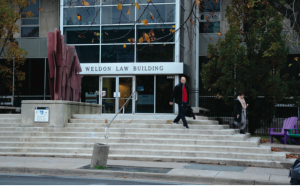
University assigned convocation that conflicts with mandatory training and exams

Roughly half of this year’s graduating class of law students signed the petition.• • • Photo by Jennifer Gosnell
Law students are petitioning for their convocation to occur on a different date after Dalhousie administration attempted to combine the convocation dates of different faculties.
The Schulich School of Law’s convocation was originally scheduled for May 22. This date has since been shifted to May 29 – four days prior to the June 2 Ontario Bar exams.
The Professional Legal Training Course (PLTC) in BC, a course that takes the place of a Bar Exam, is scheduled to begin on May 25 – four days prior to convocation.
The graduating class of the law program responded to the change with a petition requesting that the date be changed. Initially a grassroots effort, it has now been taken up by the Dalhousie Law Student Society (DLSS), and has secured at least 80 signatures – slightly under half the class of 2015.
As a direct result of this petition, a plebiscite regarding these issues is due for the week of Nov. 10 to reach a compromise with Dal. This compromise would have the convocation rescheduled to May 26.
DLSS President Anthony Rosborough says the May 26 convocation date still marks issues for some students. He says the ideal date would be May 22, and is dissatisfied that it is unclear whether the university had discussed the convocation dates with the law school prior to posting them.
“It’s a national university and a national law school,” says Rosborough. “The university is not fulfilling its obligations.”
When the DLSS requested to see the process and documentation the university undertook in determining the timing of its convocation dates, they were not presented with any further information.
Rosborough says he understood anecdotally that most law students would rather miss their convocation than be delinquent in their professional duties.
“[I] sympathize with the university, but many students have spent lots of time, effort, stress, and money to come to convocation,” he says.
Dalhousie administration has not responded to the Gazette’s request for comment.
In a statement given to CTV News, Mairead Barry, the university’s assistant vice-president of enrollment management, said: “There are other students as well, many others that have already made travel arrangements based on the posted dates of convocation, so changing the date at this point could be an inconvenience for them and their families as well.”
These changes to the general scheduling of the convocation have not been put forward through either the University Senate or the University Board of Governors at any point in 2013 or 2014.
A similar event occurred at the Sept. 15 session of senate, where “a question [was] raised regarding the timing of the October convocations and the difficulties this may present for faculty members who are teaching during these time periods.”
These minutes note that this question was to be raised with the Registrar’s Office, and reported on in future senate meetings. No current policies of the university outline the process by which convocation is scheduled.
At the Oct. 14 Faculty of Arts and Social Sciences faculty meeting, Dean Robert Summerby-Murray explained the new convocation schedule.
The presentation provided explained that such changes mostly stemmed from the desire to have a convocation model which has three convocations a day, at 9 a.m., 12:30 p.m., and 4:00 p.m., in order to allow for the convocation period as a whole to be compressed.
At this time, the DSU has not taken a stance on the issue.
Ed. Note: this story was written before the week of Nov. 10, the scheduled week of the plebiscite.






